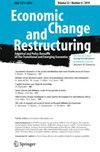教育在欧洲创新与移民关系中的作用
IF 4.3
3区 经济学
Q1 ECONOMICS
引用次数: 0
摘要
摘要 本研究利用 2012 年至 2020 年的面板数据,考察了欧盟 15 国集团和瑞士的低技能移民流动与创新之间的关系。实证部分源自我们构建的理论模型。在解决了移民在人口中所占比例的潜在内生性问题后,我们发现,移民人口相对较多的地区对专利申请的产生有有利影响,而低技能移民对创新的影响则相反。因此,研究结果符合理论部分的命题,即教育程度较低的移民决定了经济中的社会收益递减。本文章由计算机程序翻译,如有差异,请以英文原文为准。
The role of education in innovation–migration nexus in Europe
Abstract
Using panel data between 2012 and 2020, this research examines the relationship between the flows of low-skilled immigrants and innovation in the EU-15 group of nations and Switzerland. The empirical component is generated from a theoretical model that we construct. After addressing the potential endogeneity of the share of immigrants in the population, we find that regions with a relatively high immigrant population have a favorable impact on the generation of patent applications, whereas low-skilled immigrants have the reverse effects on innovation. Hence, the results are in line with the proposition in the theoretical section that lower-educated immigrants determine social decreasing returns in the economy.
求助全文
通过发布文献求助,成功后即可免费获取论文全文。
去求助
来源期刊

Economic Change and Restructuring
ECONOMICS-
CiteScore
4.80
自引率
6.50%
发文量
78
期刊介绍:
Economic Change and Restructuring has been accepted for SSCI and will get its first Impact Factor in 2020!Since the early 1990s fundamental changes in the world economy, under the auspices of increasing globalisation, have taken place
On one hand, the disappearance of the centrally planned economies and the progressive formation of market-oriented economies, have brought about countless systematic changes, where new economic structures, institutions, competences and skills involve complex processes, changes which are still underway and which necessitate adaptation and restructuring to form competitive market economies.
On the other hand, many developing economies are making great strides as regards economic reform and liberalisation, and are emerging as new global players. They show an innovative capacity to position themselves in the global economy and to compete with industrialised countries, which are generally believed to be witnessing the rapid erosion of their established positions. These developments are accompanied by the exacerbation of the world competition.
Both processes involve transition and the emerging economies, in searching for a new role and scope for public policies and for a new balance between public and private partnership, seem to currently be converging, especially with respect to the policies needed to create appropriate and effective market institutions and integrated reform policies, and to increase the standards of the population''s education levels.
Thus, liberalisation and development policies, in attempting to strike a difficult balance between social and environmental needs, must be integrated more coherently. This complexity calls for new analytical and empirical approaches that can explain these new phenomena, which often go beyond the over-simplified facts and conventional ''wisdom'' that emerged at the start of the transition in the early 1990s.
Economic Change and Restructuring (formerly ''Economics of Planning''), by keeping abreast of developments affecting both transitional and emerging economies, is aimed to attract original empirical and policy analysis contributions that are focused on various issues, including macroeconomic analysis, fiscal issues, finance and banking, industrial and trade development, and regional and local development issues.
The journal aspires to publish cutting edge research and to serve as a forum for economists and policymakers working in these fields.Officially cited as: Econ Change Restruct
 求助内容:
求助内容: 应助结果提醒方式:
应助结果提醒方式:


